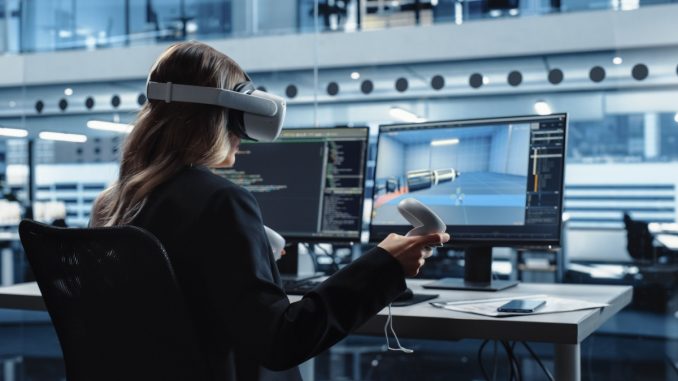
As innovative technologies become more commonplace, the opportunity to unlock value becomes more accessible.
And with the news Friday (June 14) that industrial metaverse company DataMesh raised a new funding round to develop its enterprise metaverse platform, tapping into the potential that digital ecosystems offer is top of mind for forward-thinking firms, particularly those in manufacturing and industry.
That’s because a new wave of innovations that use extended reality (XR) and metaverse-native digital twins are being positioned to help businesses digitize the management of factories, optimize production, improve efficiency, and introduce new workflows.
As just one example of how the marketplace is responding to the need for metaverse applications, on Monday (June 17) synthetic data generation firm Parallel Domain launched PD Replica, a simulation platform for autonomous system development that promises pixel-accurate digital twin 3D environments for product testing.
The killer use case of the metaverse, it turns out, may not be consumer-focused at all.
Industrial metaverse solutions can help streamline business-to-business (B2B) processes and global commerce by allowing suppliers to showcase their products in a virtual space and giving buyers a chance to interact with products in a simulated environment. Digital twins can enable suppliers to offer highly customized products and services by simulating and adjusting to specific buyer requirements before physical production.
Read more: Virtual Prototyping Powers Industry 4.0 Transformation
Revolutionizing Traditional Industries
After all, as businesses within the industrial and manufacturing sectors embrace the advantages of the metaverse across their supply chain, customer, talent and production ecosystems, the benefits for both themselves and their B2B partners become apparent.
“One thing that’s very clear is that every industrial player who is digitizing their processes is looking to capture efficiencies as a result of that modernization,” Prateek Kathpal, president and CEO of SymphonyAI Industrial, told PYMNTS in December.
Kathpal added that he envisions a future where artificial intelligence (AI), Internet of Things (IoT), and the metaverse converge to improve monitoring, industrial operations and sustainability in manufacturing.
That’s because creating immersive environments can facilitate real-time collaboration and training without the constraints of physical presence. This is particularly beneficial for global manufacturers with teams spread across the world. Engineers, designers and managers can meet in a virtual environment to discuss project details, review designs, and make decisions swiftly. This real-time interaction reduces the delays associated with traditional communication methods and accelerates the decision-making process.
And when combined, the metaverse and digital twins create an ecosystem that spans the manufacturing process, from design and production to deployment and maintenance.
Read also: 5.5G Reasons Why Meta, LG Are Teaming Up On XR Devices
Leveraging Smart Factories
A digital twin is a virtual replica of a physical product, process or system that is used to simulate, predict and optimize performance in real time.
Digital twins can prove to be particularly invaluable for predictive maintenance, as they enable real-time monitoring of machinery and equipment, predicting failures before they occur. For instance, a digital twin of a factory floor can monitor vibrations, temperature and other critical parameters, alerting maintenance teams to potential issues before they lead to costly breakdowns. This predictive maintenance approach reduces downtime and extends the lifespan of assets.
The benefits of the metaverse and digital twins extend beyond the manufacturers themselves to their B2B partners. Enhanced collaboration tools enable better communication and coordination with suppliers, distributors and other stakeholders. Predictive maintenance reduces disruptions in the supply chain. Customization allows manufacturers to offer tailored solutions to their B2B clients, strengthening relationships and opening new opportunities.
Ultimately, even though the metaverse may have, for the most part, fallen out of the public’s consciousness, it is rising up in new and surprising areas across the industrial economy. And for businesses that have already started their digital transformation journey, as well as those looking to leapfrog their competitors, the industrial metaverse represents an opportunity.











